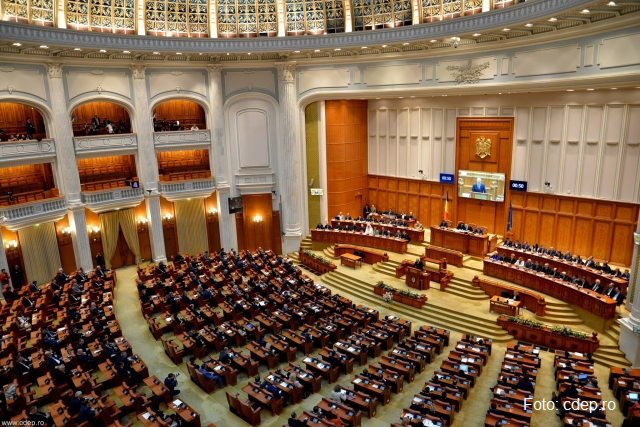The
justice laws in the focus again
President
Klaus Iohannis has challenged at the Constitutional Court the law on the status
of judges and prosecutors, modified in Parliament, but has announced that he
was forced to promulgate the law on judicial organization. In a news conference
on Thursday, Iohannis called on Parliament to reintroduce the law into the parliamentary circuit as of next autumn and
put it in line with the recommendations of the Venice Commission. The President
has criticized the lack of transparency of the ruling coalition made up of the
Social Democratic Party and the Alliance of Liberals and Democrats in passing
these laws and has said the outcome is worrying. Iohannis has also announced
that he notified the Constitutional Court about the law on the status of
magistrates.
Klaus Iohannis:
At the moment, as regards the law on judicial organization, I have
unfortunately exhausted all constitutional ways to challenge it, and therefore
I must promulgate it. But this does not mean that the road is closed for good.
As regards Law 303/2004 that has been modified, regarding the status of judges
and prosecutors, recently reexamined by Parliament, I will notify the
Constitutional Court and firmly require that the Venice Commission’s opinion be
taken into account.
President
Iohannis has pointed out that parliamentarians’ loyalty should lie with the
Romanian people, who still want to be part of the EU and not be shown as a
negative example in Europe.
In
response to that, representatives of the governing coalition have recalled that
the justice laws have been amended in keeping with the rulings of the
Constitutional Court and say that discussing them again in parliament would
make no sense. The opposition, however, supports the request made by the head
of state, namely for the Government to take into consideration the
recommendations made by the Venice Commission.
On
Monday, the Justice Minister Tudorel Toader said Romania would send its
official opinion to the Venice Commission before the latter’s final report on
the matter. The Venice Commission’s recommendations are generally complied with
by the member states. The Venice Commission has warned that the changes brought
to the three justice laws will most likely undermine the independence of
Romanian judges and prosecutors and weaken people’s trust in the judiciary.
The setting up of the Sovereign Fund for Development and Investment,
declared unconstitutional
The
Sovereign Fund for Development and Investment will be set up through a Government
decree, after the Constitutional Court ruled that this cannot be done by means of a law, the
Romanian Finance Minister Eugen Teodorovici has announced. On Wednesday, the
Constitutional Court accepted the
notification made by the Romanian President and the opposition parties,
according to which the setting up of the Fund was not the prerogative of
Parliament but of the Government, and therefore Parliament violated the principle
of separation of powers.Under that law, 33 companies, in which the Romanian state is a
shareholder, were to be included in the Sovereign Fund for Development and
Investments, whose initial capital would amount to around 2 billion Euros.
Bucharest asks for EU support to
combat the effects of African swine flu
Romania has requested funds from the European Union
for the farmers affected by an outbreak of African swine fever in pigs. The
request was made on Tuesday by the agriculture minister Petre Daea at a meeting
in Brussels with his EU counterparts.The money would help cover the losses suffered by
farmers following the culling of the sick pigs, the suspension of meat
production and a drop in the price of pork in the areas affected. The aid will
also cover costs related to cleaning and disinfection and the destruction of
fodder, the Agriculture Ministry has announced, saying
that Romania continues to take measures to
contain the virus. At the moment, most outbreaks have been reported near the
border with Ukraine.More
than 300 cases have been reported so far.
The Romanian Government earmarks 1
billion Euros for the protection of the cultural heritage
The
Bucharest Government has approved the financing of two extensive cultural
projects worth a total of 12 million Euros. These projects are E-culture:
Romania’s Digital Library and Historical monuments, strategic planning and
optimized public policies, respectively. Under the E-culture project, 550,000 cultural resources will be
included in Romania’s digital library, and an IT platform for the digital
library and a catalogue titled ‘culturalia.ro’ will be created. Also, some
200,000 cultural resources will be included in the europeana.eu portal. The
second project’s outcome will be a cultural heritage code, as well as a
national strategy concerning the preservation of historical monuments. The
projects will benefit from European non-reimbursable funding. Also on
Thursday, the government adopted an emergency ordinance regarding the approval
of an investment program in culture. One billion Euros have been allocated for
its implementation, based on which multi-annual financing programmes can be
signed. Its beneficiaries are the central public authorities, including the
Ministry of Culture and National Identity, as well as its subordinated
institutions, irrespective of the system of financing, as well as the local
public administration. The money will be used for the purchase of historical
monuments and classified tangible cultural assets, by exerting the state’s right
of preemption, the construction of cultural buildings to host cultural,
information and educational activities, as well as for intervention,
rehabilitation and/or modernization and restoration works.

